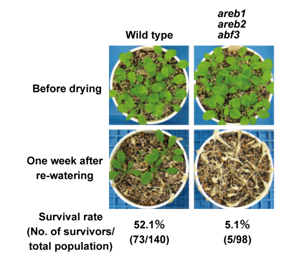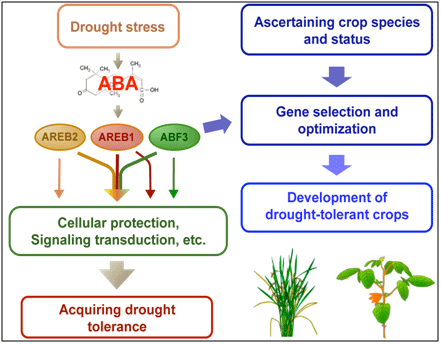Three kinds of AREB transcription factors cooperatively regulate ABA-mediated drought stress tolerance
Description
Drought has been seriously damaging agriculture, and damage is most severe in developing countries. An important strategy to meet food demands with less water is to develop crop varieties with increased tolerance to drought. Under drought stress, abscisic acid (ABA) levels increase in plants, thereby triggering the expression of many genes that function in stress tolerance. In this study, using molecular analyses in model plants Arabidopsis and rice, we have revealed that multiple AREB-type transcription factors cooperatively regulate ABA-mediated drought stress tolerance. Our elucidation of the genetic mechanisms underlying drought tolerance establishes the technical platform essential to develop drought-tolerant crops in developing countries.
In Arabidopsis, three members of the AREB-type transcription factors, AREB1, AREB2 and ABF3, cooperatively regulate the plant response to water stress. (Fig. 1 and 2) These factors control the expression of many regulatory genes, e.g., encoding transcription factors, protein kinases and phosphatases, as well as the expression of functional genes, such as encoding LEA class proteins. While AREB1, AREB2 and ABF3 have largely overlapping functions, our results also show that each of them may play a specific role (Fig. 2): AREB1 has higher transactivation ability induced by ABA, AREB2 is induced more highly by salt stress, and ABF3 retains greater transactivation ability than the other two even without ABA. Similar to AREB1, AREB2 and ABF3 in Arabidopsis, three AREB-type transcription factors, OsAREB1, OsAREB2 and OsAREB8 are involved in transcriptional activation of drought-tolerance related genes in rice. Moreover, our phylogenetic analysis revealed that the AREB-type transcription factors are conserved not only in Arabidopsis, rice and soybeans, but rather universally throughout all land plants, including mosses and ferns.
Our findings support the idea that the drought tolerance system regulated by AREB-type transcriptional factors is well conserved not just in Arabidopsis but also in crops, like rice and soybeans. This functional conservation makes this system an important target for crop improvement with respect to drought tolerance. Furthermore, the findings of functional characteristics among AREB-type transcription factors can be put to development of appropriate drought-tolerant crops. Considering both the overlapping and specific functions of these three AREB-type transcription factors, the combinations of genes and promoters can be optimized to appropriately meet the various needs of different crop varieties or according to levels of drought (Fig. 2).
Figure, table
-
Fig. 1.
Drought-tolerance phenotype of triple knock-out mutants for AREB-type transcription factors (AREB1, AREB2 and ABF3) in Arabidopsis. Photographs show plants before and after stress treatment. Watering was withheld from 3 week-old plants for 11 days, and then watering was resumed for 1 week before the photograph was taken. Survival rates were calculated from the results of five independent experiments. -
Fig. 2.
Model for the development of abiotic stress-tolerant crops using three kinds of AREB-type transcription factors that cooperatively regulate ABA-mediated drought stress tolerance. AREB1, AREB2 and ABF3 cooperatively regulate the ability of plants related to drought tolerance. While the transcription factors have overlapping functions, each of them has its own specific roles.
- Affiliation
-
Japan International Research Center for Agricultural Sciences Biological Resources Division
- Classification
-
Administration A
- Term of research
-
FY2006~2010
- Responsible researcher
-
YOSHIDA Takuya ( Biological Resources Division )
FUJITA Yasunari ( Biological Resources Division )
YAMAGUCHI-SHINOZAKI Kazuko ( Biological Resources Division )
- ほか
- Publication, etc.
-
Yoshida, T., et al. "Yamaguchi-Shinozaki K. AREB1, AREB2, and ABF3 are master transcription factors that cooperatively regulate ABRE-dependent ABA signaling involved in drought stress tolerance and require ABA for full activation." The Plant Journal 61 (2010): 672-685.
Fujita, et al. (2010) Plant signaling : molecules and response. KYORITSU SHUPPAN, pp.84-91.
- Japanese PDF
-
2010_seikajouhou_A4_ja_Part9.pdf263.96 KB


